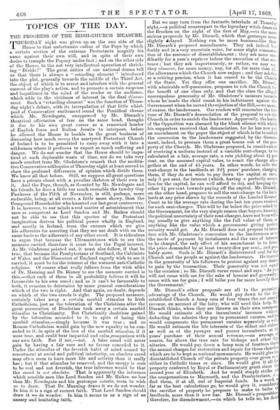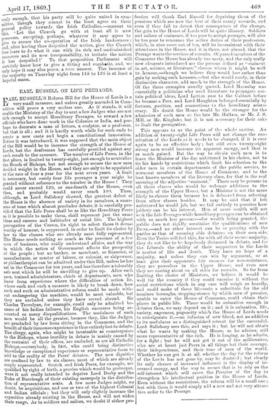TOPICS OF THE DAY.
THE PROGRESS OF THE IRISH-CHURCH MEASURE.
THURSDAY night was given up on the one side of the House to that unfortunate cultus of the Pope by which a certain section of the extreme Protestants magnify his name against their own will, and in spite of their own desire to trample the Papacy under foot ; and on the other side of the House, to the not very intellectual operation of shrieking " Divide !" The great critics of our national drama tell us that there is always a " retarding element " introduced into the plot, generally towards the middle of the Third Act, the object of which is to arrest and interfere with the general current of the play's action, and to promote a certain suspense and impatience in the mind of the reader or the audience, which adds to the vividness of interest in the final denouement. Such a "retarding element" was the function of Thursday night's debate, with its interpolation of that little whirlpool of Conservative excitement round the Pontifical throne which Mr. Newdegate, unappeased by Mr. Disraeli's theatrical affectation of fear on the same head, thought it due to his own great career as a renowned hunter of English foxes and Italian Jesuits to interpose, before he allowed the House to buckle to the great business of discussing how much money the martyred Protestant Church of Ireland is to be permitted to carry away with it into a wilderness where it professes to expect so much suffering and danger. We do not wonder that the House should be impatient at such deplorable waste of time, nor do we take very much comfort from Mr. Gladstone's remark that the meditative Conservative soliloquies of Thursday night at least served to show the profound differences of opinion which divide them. We knew all that before. Still, we suppose all great questions have a private closet with a peculiar skeleton of their own in it. And the Pope, though, as flaunted by Mr. Newdegate and his friends, he does a little too much resemble the tawdry Guy Fawkeses of the Fifth of November, is still, perhaps, more endurable, being, at all events, a little more showy, than the Compound Householder who haunted our last great controversy. It is, however, to our minds a real matter of astonishment that men as competent as Lord Sandon and Mr. Raikes should not be able to see that this spectre of the Protestant imagination derives his political power wholly in England, and mostly in Ireland, from the excuses which we give his adherents for asserting that they are not dealt with on the same basis as the adherents of any other creed. It is ridiculous to argue that because the Ultramontanes wish to see this measure carried, therefore it must be for the Papal interest. As Mr. Gladstone pointed out, it must also follow, if that be true, that because the Presbyterians of Scotland, the Calvinists of Wales, and the Dissenters of England eagerly wish to see it carried, it must be for the interest of the warmest anti-Catholic religions. Of course what really follows from the wish alike of Dr. Manning and Dr. Binney to see the measure carried is this,--that each of them in all probability believes it will be favourable to his own creed ; and as it can't be favourable to both, it remains to determine by more general considerations which of the two is right. And that again, no doubt, depends on which of the two creeds is right. The proposed measure, certainly takes away a certain morbid stimulus to Irish Catholicism, just as the toleration of the Christians after the great persecution of Diocletian took away a certain morbid stimulus to Christianity. But Christianity doubtless gained by the toleration accorded to it, in spite of losing this morbid stimulus,—simply because it was true ; and so Roman Catholicism would gain by the new equality to be conceded to it, in spite of the loss of the morbid stimulus, if it were true, and could bear impartial and calmsomparison with our own faith. But if not,—not. A false creed will never gain by having a fair race and no favour conceded to it. Under the stimulus of the feverish habit of mind caused by resentment at social and political inferiority, an obsolete creed may often seem to have more life and activity than it really has but if that stimulus be removed, and the energy is seen to be real and not feverish, the true inference would be that the creed is not obsolete. That is apparently the inference which sensible men like Lord Sandon and Mr. Raikes, no less than Mr. Newdegate and his grotesque coterie, seem to wish us to draw. That Dr. Manning draws it we do not wonder. In him it is a sign of earnest faith. That Lord Sandon should draw it we do wonder. In him it seems to us a sign of an uneasy and hesitating faith. But we may turn from the fantastic interlude of Thursday night,—a political counterpart to the legendary witch dance on the Brocken on the night of the first of May,—to the more serious proposals by Mr. Disraeli, which that grotesque scene slightly slelayed. Nothing can be more business-like than Mr. Disraeli's proposed amendments. They ask indeed 11-,t, feebly and in a very uncertain voice, for some slight commutation of the sentence of disestablishment ; they ask more con. fidently for a year's reprieve before the execution of that Feu. tence ; but they ask importunately, or rather, we may say, they clamour, for more money, nay, for all, for more than all the allowances which the Church now enjoys ; and they ask this as a retiring pension, when it has ceased to be the Churels of the State. Yet they offer one sacrifice. Mr. Disraeli, with admirable self-possession, proposes to rob the Church for the benefit of one class only, and that the class the alleged unscrupulous generosity of Mr. Gladstone's measure towards whom he'made the chief count in his indictment against the when he moved therejectionof the Bill,—we mean, of course, the landowners. Our readers will remember the fervour of Mr. Disraeli's denunciation of the proposal to rob the Church in order to enrich the landowner. Apparently, the leader of the Opposition was alarmed by the blank silence with which his supporters received that denunciation, for he has now put an amendment on the paper the object of which is far to outbitl the concession to the landowners suggested by the Government, indeed, to procure them a great bonus out of the property of the Church. Mr. Gladstone proposed, in consideration of receiving a uniform instead of a variable rent-charge, to be calculated at a fair, average rate, a rate yielding about 41 per cent. on the assumed capital value, to remit the charge altogether at the end of 45 years. In other words, he sells the rent-charge to the landlords at 22i years' purchase, charging them, if they do not wish to pay down the capital at once, only 3 per cent. for interest (which, having a perfectly secure lien for the capital, he can well afford to do), and keeping the other 11per cent. towards paying off the capital. Mr. Disraeli, on the other hand, proposes to sell the rent-charge to the lanilords at any price shown by the records of the Landed Estates' Court to be the average rate during the last ten years received for such rent-charges. This will be far below the price asked 15 the Government, for the very simple reason that buyers, knowing the political uncertainty of their rent-charges, have not been willing usually to give anything like the full value• of them, or anything like the value which a government giving perfect security would get. As Mr. Disraeli does not propose to interfere with Mr. Gladstone's concession to the landowners as to the mode of payment by instalments and the rate of interest to be charged, the only effect of his amendment is to lower the price demanded by at least twenty-five per cent., and probably more. Such is Mr. Disraeli's disinterested zeal for the Church and the people as against the landowners. He trusted in the generosity of his followers to protest against any desire to gain by the transaction. Their generosity was not equal to the occasion ; so Mr. Disraeli turns round and says, As yeti will not come with me for the sake of honour and generosity, come with me for gain ; I will bribe you far more heavily than the Government.'
Mr. Disraeli's other proposals are all to the pecuniary advantage of the Church. He would pay down to the chiestablished Church a lump sum of four times the net annual revenue, on account of the laity, who will need this help, 31r. Disraeli thinks, when they are thrown on their own resource: He would estimate all the incumbents' incomes wi11113'' deducting the salaries they pay to permanent curates, and be would compensate the permanent curates separately as well. He would estimate the life interests of the oldest and riches: as well as of the younger and poorer incumbents, at 14. years' purchase of their annual revenue,—an average, 01 course, far above the true rate for bishops and other dignitaries. He would pay down a lump sum of fourteen time the annual charges for restoration and repair for those churches which are to be kept as national monuments. He would give the.
.
disestablished Church all the private property ever given 101' either in Catholic times or since. He would give it all 119 property conferred by Royal or Parliamentary grant since the second year of Elizabeth. And he would simply strike the compensations to Maynooth, and the Presbyterians, find them, if at all, out of Imperial funds. In a word, far as the best calculations go, he would give it, collude the sacrifice of property he proposes to make to bribe landlords, more than it now has. Mr. Disraeli's propositio therefore, for disendowment,—on which he tells us, no do truly enough, that his party will b3 quite united in committee, though they cannot in the least agree on their general policy towards the Irish Catholics,—amount to this, 'Let the Church go with at least all it now possesses, excepting, perhaps, whatever it may agree to give to secure the co-operation of the Irish landowners ; and, after having thus despoiled the nation, give the Church free leave to do what it can with its rich and undiminished resources and its now irresponsibility, to irritate the nation it has despoiled ?' To that proposition Parliament will certainly know how to give a fitting and emphatic, and, we only hope it may also prove, a terse answer. The increase of the majority on Thursday night from 118 to 12G is at least a hopeful omen.



































 Previous page
Previous page